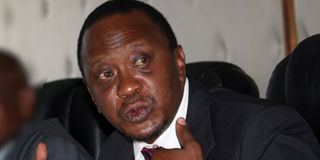Uhuru walks a tightrope as charges threaten ambition

Deputy Prime Minister Uhuru Kenyatta. Photo/LIZ MUTHONI
Just when Deputy Prime Minister Uhuru Kenyatta has emerged as the clear front-runner in central Kenya for the 2012 General Election, comes the threat of being put in the dock over post-election violence.
With trials at the International Criminal Court likely to stretch beyond next year, Mr Kenyatta will be a distracted man defending himself at The Hague when he should be concentrating on domestic politics.
If he is forced to surrender office as Deputy Prime Minister and Minister for Finance, Mr Kenyatta will lose a key vantage at the centre of politics beside President Kibaki as the presumed heir.
Succession politics
Mr Kenyatta has been in the thick of Kibaki succession politics and has over the past year managed to edge clear ahead of rivals such as Internal Security minister George Saitoti, former Justice Minister Martha Karua and assistant minister for Planning Peter Kenneth.
He has also been at the centre of a “Stop Raila” movement alongside The Hague co-accused William Ruto and Vice-President Kalonzo Musyoka.
The three make up the so-called KKK (Kikuyu, Kalenjin, Kamba) triumvirate dedicated to blocking Prime Minister Raila Odinga’s ascension to State House.
Mr Kenyatta, Mr Ruto and Mr Musyoka are all declared presidential candidates, but they are working in tandem to stop a common foe, possibly through a pact that would see them throw their collective weight behind one of them.
If two of them are stymied by The Hague, then the dynamics within the KKK group changes. And for Mr Kenyatta, an indictment could be devastating as regards to his presumed leadership of central Kenya, with rivals outside the KKK grouping waiting to capitalise on his woes.
While Mr Kenyatta has been endorsed by the key central Kenya political heavyweights, the shifting sands of politics dictate that his travails would open way for other contenders.
One peculiarity about Mr Kenyatta’s position is that he is in many ways a leader without a party. He is the national chairman of Kanu, but he long ago gave up any pretence of loyalty to the former ruling party he led to a first electoral defeat in 2002.
Since the last election, Mr Kenyatta’s political vehicle has been President Kibaki’s PNU alliance, an outfit chaired, unenthusiastically, by Prof Saitoti.
He also has the added complication that Rift Valley politicians led by his former ally, ex-President Moi’s son Gideon, have recently tried to strip him of the Kanu chairmanship as part of a strategy to reclaim the former “Mama na Baba” party as the political vehicle for the northern Rift Valley.
His position in Kanu should be the least of Mr Kenyatta’s worries right now. He has a certain Mr Luis Moreno-Ocampo to contend with.
Yet while the moves by the International Criminal Court prosecutor could deal him a devastating blow, they could also, within central Kenya, earn Mr Kenyatta a political legitimacy that has been hard coming.




